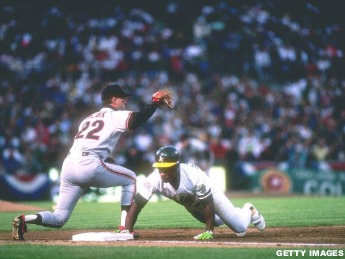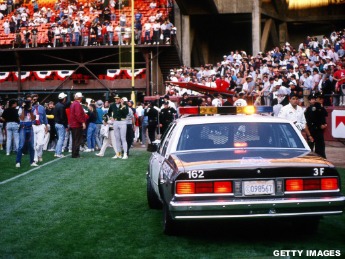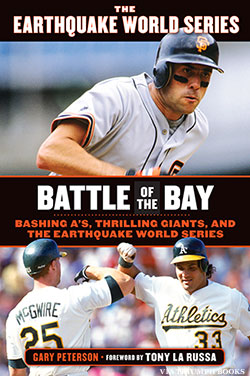Giants and Athletics fans remember the 1989 World Series as the only cross-Bay championship in history. But for many across the country, the lopsided championship series is best known for the Loma Prieta earthquake that interrupted play for 10 days. In Battle of the Bay, Gary Peterson chronicles how the World Series and an earthquake became entwined with one another. Here is ThePostGame's exclusive interview with the author.
ThePostGame: My guess is that, in the aftermath of the 1989 World Series, your first thought wasn’t to write a book about it. How did the putting the experience in book form coalesce over time?
GARY PETERSON: Well, it certainly left an impression on me, from a personal standpoint and from something to cover. That stuck with me. I didn't even think about it until an editor called about 18 months ago and said, 'You know, the 25th anniversary of that World Series is next year, and I heard you were there. Want to write a book about it?' It kind of fell out of the sky.
TPG: Can you describe dynamic that took shape between Giants and A’s fans leading into the World Series?
PETERSON: It was kind of a friendly spirited-type rivalry. It was what sports does best sometimes: it brings us together even as we're celebrating our differences. 'Are you a [Will] Clark guy? Well, I’m a [Jose] Canseco guy.' 'I can't believe you guys use the [designated hitter] position.' At this point, it’s a once-in-a-lifetime experience, so there was a lot of interest.

TPG: Outside of the earthquake, what did that World Series offer that made it a worthy subject?
PETERSON: The season was interesting. Competitively, it was probably the least competitive World Series there's ever been. The A’s, you can say in hindsight that they were a great time at the height of their success. The Giants were a good team, but they were dinged up. They had trouble getting good performances out of their key players. Will Clark had messed up his knee in the regular season, and in the playoffs he had tonsillitis. He looked like death warmed over.
If there wasn't an earthquake, it probably wouldn't have been very memorable.
TPG: What are the challenges of writing about something that happened 25 years ago -- particularly something that involves personal elements that aren’t documented the way the World Series was?
PETERSON: This was my first book, so I'm sure I can say it was easier than it would have been at the five-year anniversary. Now we have electronic archives at work, and you can find anything about baseball on the Internet. Part of the challenge is if your readers don't remember or vaguely remember it, they maybe don't remember it in detail, [you want to] try to bring events into context: The emotion, some of the key moments during the season, what was the key relationship between the teams in the Bay Area?
Up until that time, the big dynamic was one team wasn’t doing very well and the other team was thinking about leaving. To try to recreate the time and place was kind of the challenge.
TPG: How did the earthquake itself -- and its aftermath -- put the actual game into perspective for you?
PETERSON: Well, it scared the life out of me. I've been a baseball fan for years. My first memories are collecting cards and watching games, and I wrote a column a few days after [the earthquake] and said they should call it off.

Think about that: A lifelong fans says, 'They shouldn't proceed with this.' Over time, where it started as a regional friendly rivalry, suddenly we were celebrating what brings us all together, and that's our concern for each other, helping our the region and honoring people who had lost loved ones.
For me, the challenge was caring enough about the game to write about it.
TPG: What is the historical relevance of an event like that -- not just the earthquake or the World Series on its own, but the relevance in terms of how the two came together?
PETERSON: It put baseball in a position of being a healing force in the Bay Area. We’ve seen that happen before, the Yankees playing in the playoffs a month after 9/11, it was part of the city's healing process. Same with the Saints winning the Super Bowl a year after Hurricane Katrina. Anytime you go through a life-changing or potentially life-ending experience, our human spirit and our nature is to get back to doing the things we like to do.
Even though there were buildings and the freeway in shambles, there was still unfinished business in cleaning up after the earthquake, baseball brought us together and showed us things were going to get better. We were going to pull back together and move past this. You get back to [work] and you do what you do. Baseball helped the Bay Area unite and get back to a sense of normalcy.

TPG: In your book, you discuss the logistical nightmare of trying to file stories using stone-age equipment and land-line phones compromised by the earthquake. What was it like revisiting that experience and contrasting it to the technology you now use to report on a daily basis?
PETERSON: It’s night and day. Talk about trying to evoke a sense of place and time. Two or three times [in the book] I had to stop and remind readers that this was before wireless, before the Internet.
I had this portable TV I had brought with me to the stadium. This was how I watched games I was attending, and it's how I looked for news after the earthquake. It would have been a breeze today. I think back specifically about having to take my portable word processor back into the stadium so I could transmit that story -- that was not pleasant. And it was extremely difficult. It served as a bench mark: 25 years is not that long but using a calendar to determine how far we've come in such a short time, it does seem like [1989] was in another century.
TPG: When play finally resumed after a 10-day break, did the earthquake feel like a past event? Or was it still a living thing that everyone was trying to move past?
PETERSON: It was still a little bit difficult. [Then-Oakland manager] Tony LaRussa has always been a really thoughtful person, and he said, 'We always tie that earthquake to the baseball game because they happened on TV together, but they were two separate things that just happened to occur at the same time. LaRussa points to Cal and Stanford and says 'They're playing this weekend,' the opera house is open this weekend, etc. But for me, it was still hard to divorce the two, especially being in a stadium that had rocked and rolled less than two weeks earlier.
I did have trouble getting on. I don’t know if that was universal. But then you get back into it, and eventually you find you can trust the ground you walk on again. But I didn't have any enthusiasm for going to that game.
-- Battle of the Bay is available for purchase from the publisher, Amazon, Barnes & Noble and iTunes. Follow Gary Peterson on Twitter @garyscribe.






